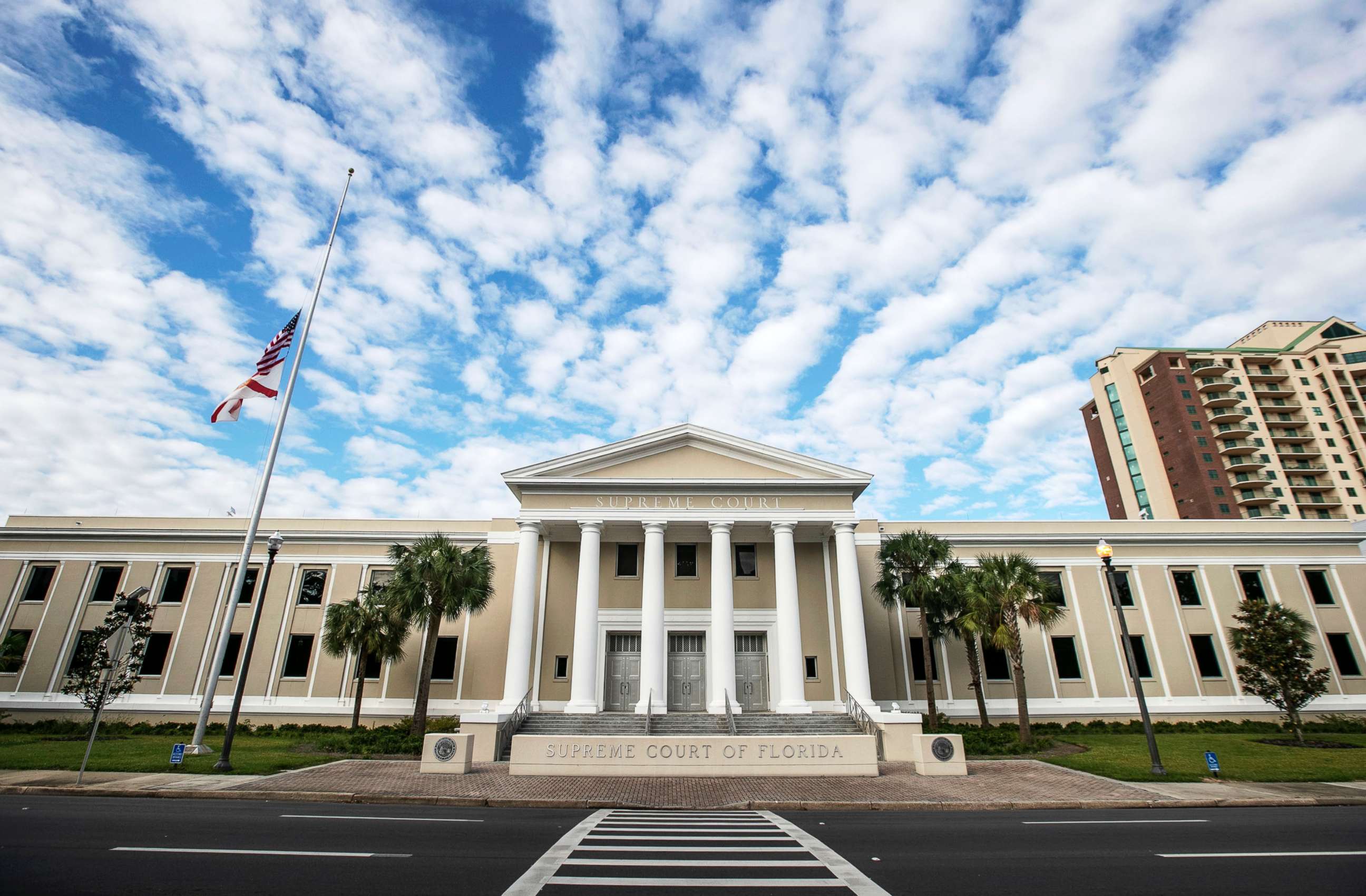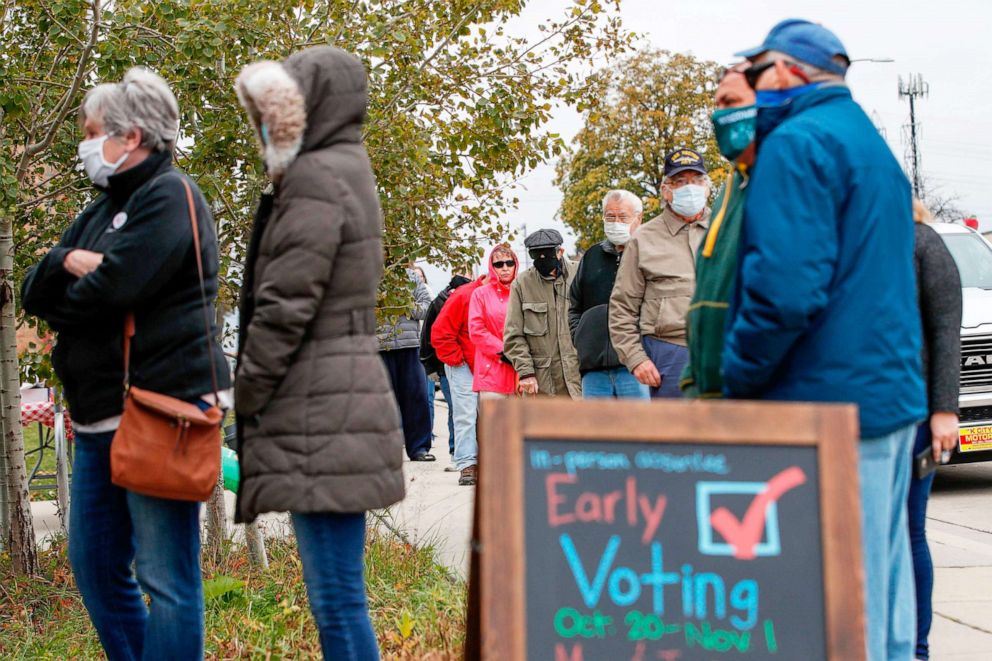Politicization of state supreme courts looms over possibility of contested vote
More than half a billion dollars have been pumped into races since 2000.
If legal controversy engulfs the 2020 elections, state supreme courts may be thrust into the prominent role of referee for the presidential race for the first time in two decades -- placing new focus on judicial appointees that have increasingly shown partisan leanings.
"Without a doubt over the last 20 years we have seen spending in these races change to the point where the selection of state supreme court justices resembles any other partisan election," said Douglas Keith, an election researcher at the nonpartisan Brennan Center for Justice.
"There are a number of state courts that, if they come to be major players in this election, there is a history of politicization," Keith said.
In the intervening years since Florida's supreme court took on the state's hotly contested 2000 election recount, the politicization of state supreme court elections and appointments has "reached a fever pitch," according to Keith. The Brennan Center found more than half a billion dollars has been poured into state supreme court elections since 2000 -- reinventing the one-time "sleepy low-dollar contests," as Keith put it, into an arena for dark money and political dogfights.
And while both sides of the partisan divide have sought to gain an edge in the judicial arms race, conservative groups have prioritized efforts to tip the balance of these crucial courts.
In the past decade, Keith said, "we have seen a project on the right of gaining control over state supreme courts," adding that political action groups like the conservative Judicial Crisis Network and others have been "actively engaged in a campaign to take over state supreme courts."
In some states, adding justices to the court by appointment has made the politicization in these bodies even more overt. Republican governors in Arizona and Georgia, for example, have managed to "entrench the conservative majority," Keith said, by adding seats.

In Florida, the site of the infamous 2000 recount, progressive groups have decried the state's Republican governor, Ron DeSantis, for appointing three members of the Federalist Society, a powerful conservative legal group, as justices during his first 22 months in office.
Damien Filer of Progress Florida, a left-leaning nonprofit, said DeSantis' efforts to tip the balance of Florida's supreme court reflect "in an eerily parallel way" President Trump's opportunity to nominate three justices to the U.S. Supreme Court due to vacancies that opened up during his presidency.
"It is very unsettling to imagine the role of a combination of a Florida supreme court and a U.S. Supreme Court that has been remade to just reflect the political interests of one party, instead of the interests of the people," Filer said. "The potential consequences of that are just very unsettling."
Florida is not alone in its recent push to the right. State supreme courts in battlegrounds like Wisconsin, Arizona, and Michigan also hold conservative majorities. Among other key states up for grabs, only Pennsylvania and North Carolina lean more liberal.
In Pennsylvania, the U.S. Supreme Court this week rejected an effort by Republicans in the legislature to block a state supreme court ruling that would allow ballots to be returned up to three days after November 3.
The influx of pre-election litigation surrounding election-related matters -- more than 300 cases in 44 states have already been filed, according to one account -- could offer a preview of how state supreme courts may handle post-election lawsuits or recounts.
Democrats and liberal groups have scored several victories across the country in their push to expand Americans' access to voting. According to Wendy Weiser, the director of the Democracy Program at the Brennan Center, "it has been the state courts and the state supreme courts that have been the most vigilant in protecting voting rights throughout the litigation."

Republicans, meanwhile, have taken notice of where their multimillion-dollar legal efforts have the best shot of winning. A Republican National Committee spokesperson recently pushed back on the premise that Democrats had been gaining more wins, noting that numerous decisions had come from courts they characterized as "friendly" to Democratic efforts.
"We expect to win on appeal in most or all of these cases," the spokesperson previously told ABC News.
"Even courts that lean more liberal have been rejecting many of the Democrats' baseless arguments and attempts to overhaul election laws," Mandi Merritt, an RNC spokesperson, said in a statement to ABC News on Wednesday. "The RNC will continue to fight for commonsense election integrity laws and we expect more victories to come."
Experts say that there is indeed evidence to suggest that the influx of money and politics in the state supreme courts impacts outcomes.
In one recent study from the nonpartisan American Constitution Society, election law experts concluded that "the upward spiral of big money fundraising and aggressive politics in state judicial elections pressures judges to become partisan actors who favor their own party in deciding election disputes."
"Judicial partisanship in election cases increases, and elected judges become more likely to favor their own party, as party campaign-finance contributions increase," the study found. "This influence of campaign money largely disappears for lame-duck judges without re-election to worry about."
In other words, Keith said, the research shows that judges are, in fact, "more likely to rule in favor of the political parties that support them" in election-related cases.
In light of this troubling trend, campaign finance reform advocates have focused more of their attention in recent years on curbing the flow of dark money into judicial elections and appointments at the state and national level.
Jordan Libowitz, communications director for the nonprofit watchdog Citizens for Responsibility and Ethics in Washington (CREW), said that "tighter laws are needed, governing how much in donations can be given and how much can be given to trigger disclosure."
"Some states have essentially no campaign finance laws whatsoever," Libowitz said.
Experts say this troubling evolution of the courts flies in the face of the intended role of courts as an apolitical check on the overtly politicized branches.
"The judicial branch is supposed to be different than the other political branches," Keith said.




